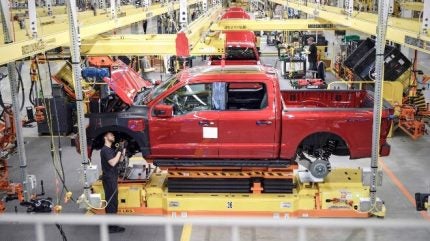
Ford’s chief executive has said it was time for the US to “get back in love” with smaller cars, according to a Guardian report.
In an interview at the Aspen Ideas festival, Jim Farley said the auto industry needed to focus on smaller EVs and commercial vehicles. He acknowledged that American consumers are in “love with these monster vehicles” but said they need to “get back in love” with small cars.

Discover B2B Marketing That Performs
Combine business intelligence and editorial excellence to reach engaged professionals across 36 leading media platforms.
“We have to start to get back in love with smaller vehicles. It’s super important for our society and for EV adoption,” Farley said. “We are just in love with these monster vehicles, and I love them, too, but it’s a major issue with weight.”
The average weight of a new vehicle sold in the US last year was 4,329lbs (2,000kg) – an increase of 1,000lbs (450kg) from 1980.
Ford expected to introduce a US$30,000 all electric vehicle which would be profitable in roughly two and a half years, breaking a price barrier that has made the adoption of EVs an unobtainable luxury to all but the auto industry’s wealthiest customers.
According to the Guardian, Farley told the festival the company’s new EV vehicle would be a BYD competitor though the Biden administration has effectively banned the Chinese company from the US by quadrupling import tariffs. It would also rival a new, entry level electric car from Tesla expected next year.
Farley said Ford would focus on the new vehicle – not larger all electric trucks and SUVs. Larger vehicles, using internal combustion engines, have traditionally driven US carmakers’ profits, especially at Ford.
“You have to make a radical change as an [automaker] to get to a profitable EV. The first thing we have to do is really put all of our capital toward smaller, more affordable EVs,” Farley reportedly said during an interview with CNBC’s Julia Boorstin.
“That’s the duty cycle that we’ve now found that really matches. These huge, enormous EVs are never going to make money: the battery is $50,000, even with low-nickel, LFP chemistry. They will never be affordable.”
A Ford spokesperson reportedly clarified he was referring to the company’s Super Duty models, which require massive battery packs to achieve ranges of 500 miles, and which are said to be heavier than a Honda Civic.
But he said the stakes were high for Ford and the other automakers over the next five years, as they seek to compete with Chinese EV makers. Farley said it was crucial for Ford, which lost $132,000 on every EV sold in the first three months of the year, to make profitable EVs in the next five years.
“If we cannot make money on EVs, we have competitors who have the largest market in the world, who already dominate globally, already setting up their supply chain around the world,” Farley said. “And if we don’t make profitable EVs in the next five years, what is the future? We will just shrink into North America,” the Guardian quoted him as saying.




